Four Days in June Read online
Page 22
‘Ah, Paget.’ Wellington addressed his second-in-command incorrectly, by the name he had used before succeeding his father to the Earldom. De Lancey knew this slight to be deliberate, and the reason for it. Famously, the Duke had not yet forgiven the flamboyant cavalryman for eloping six years ago with his sister Charlotte, and relished every available opportunity to irritate him.
‘Paget. Find Lord Edward Somerset. Take the Household Brigade and attack the French cavalry to the right of the farm.’
Uxbridge grinned with smug satisfaction. ‘I have just left General Somerset, your Grace. With those precise orders.’
‘Have you, by God. Well then you had better return and help him see them off. You must push back the infantry as well. If you are able.’
‘Your Grace.’ Uxbridge turned to the group of horsemen gathered around the Duke. Found three of his own aides. ‘Thornhill, Seymour, Wildman. Care for some sport?’ He turned his horse and pushed her back along the right of the line, towards Somerset. ‘View halloo!’
As the three officers hurried after their general, Wellington raised an eyebrow. ‘De Lancey. Ride and tell General Ponsonby that he must charge the French infantry to the east of the chaussée. The fate of the battle now rests with him. He must push them off the ridge. And tell him to mind to go no further than the slope on our own side of the valley. On no account must he either advance into the valley or attempt to attack the guns. Is that clear?’
‘Your Grace.’
De Lancey spurred his horse across the road and down the reverse slope towards where, behind the embattled infantry, the red-coated cavalry of the Union Brigade awaited the order to attack. He found Ponsonby in conversation with Arthur Clifton, the commanding officer of the leading regiment, the Royals. The general saw him approach.
‘Ah, De Lancey. D’you see them? The French? Now’s our time, surely? Have we the order to advance?’
‘You judge your moment well, Sir William. You are to take your brigade immediately and attack the infantry. But do not advance into the valley. The Peer was most adamant on that point.’
Ponsonby smiled. ‘Rest assured, De Lancey. My boys’ll send ’em to the devil. Clifton, you heard the command. Form your men. Now’s our time.’ He turned to his aide. ‘Braithwaite, m’boy. Wave yer hat in the air. The colonels know what to do. The brigade will advance. Come along, boys. To Paris!’
As Uxbridge and Seymour rode back across the main road, anxious not to miss out on accompanying Somerset, De Lancey pulled his own horse away from the flank of the Royals and watched the young lieutenant raise his hat three times to send the dragoons on their way. Watched as the magnificent horsemen began to climb the hill, fanning out for the attack, the Greys moving to the left and the centre being taken by the Inniskilling Dragoons – 400 brawny Irishmen splendidly mounted on tall, jet-black horses. And as they advanced De Lancey glimpsed perhaps the most bizarre spectacle yet in a day that was proving more curious by the minute. From behind a hedge on the reverse slope there appeared a man and a boy clad in civilian dress. The former, whom he recognized as the shock-headed Duke of Richmond, raised his top hat and cheered the cavalry as they passed as if he were waving on a Newmarket winner: ‘On, my brave boys. On to victory.’
Bemused but not wanting to become distracted, De Lancey rode back up the hill, parallel with the leading squadrons of the dragoons. He heard the buglers sound the ‘advance’ and then, somewhat absurdly, the ‘charge’: its distinctive blasts rising to a crescendo in ‘G’. For such was the mud that there was no chance of their advancing at anything more than a canter. Reaching the crest of the hill, the horsemen began to negotiate their way through the lines of British infantry behind the hedgerow. He saw the Royals split in two and pass between the three regiments of Kempt’s brigade.
The move was well executed, but nothing could prevent it from being at any more than a canter that most of them finally broke against the front rank of the French infantry. De Lancey stationed himself at the crossroads, directly behind the re-formed rifles, and watched entranced as along the line of the ridge the cavalry caught the blue-coated infantry completely by surprise, in the middle of a manoeuvre which, had it been completed, he perceived, might, with their greater numbers, quite easily have gone the way of the French. As it was, half-way between column and line, the infantry were now rendered doubly helpless as the heavy horses and their cheering, vengeful riders careered straight into them.
He watched the great flat swords, their edges cut deliberately with ugly notches, scythe down mercilessly into the ranks. Saw a French colonel mounted on a beautiful white horse attempt to engage one of the Irish dragoons, only to have his puny sword smashed in two by the weight of the other’s blade. Watched as a second cut cleaved the colonel’s nose from his face, leaving it hanging down across his mouth on a flap of skin. The man put up one hand to staunch the flow of blood and with the other turned his horse back into the mêlée, attempting to regain his lines. Then horse and rider vanished from sight. They did not rise again.
Closer to De Lancey, although a few of the French on the crest of the ridge had managed to get in a volley before the cavalry closed about them, the Royals were enjoying similar success. Panic had seized the French and they were streaming back into the valley away from the dragoons, discarding as they went anything that might slow them down. Packs, haversacks, muskets and shakos lay strewn across the hillside with the dead and wounded. Some men lay down and allowed the cavalry to ride over them before leaping up and running for their lives. The fighting seemed particularly fierce in one spot some 200 yards down the ridge. At length De Lancey saw the reason for the fury as a corporal emerged carrying across his horse’s neck a flagpole topped with an eagle. An eagle! Only two had been taken in Spain. The lone horseman, his helmet lost in the struggle, left the press of men and rode towards the Brussels road, clearly searching for Wellington’s position. De Lancey was about to guide him towards the Duke, whom he could see was positioned directly beneath the elm tree, when a flash of red caught his eye through the smoke and he realized that the dragoons had ridden on, beyond their objective.
Had they not heard him? The Peer had distinctly commanded that they should not enter the floor of the valley. Yet there they were, galloping through the French infantry and on towards the opposite slope. He strained to see through the smoke whether the other regiments had also disobeyed the order. With horror he saw that they had. Far off on the left wing the grey horses of the Scots betrayed their presence, too deep in the valley. Four, perhaps five hundred yards ahead of the Allied lines.
De Lancey headed towards the elm.
‘Your Grace. Believe me. I conveyed your wishes directly. Made it quite plain. They should not attack the guns.’
‘Of course, De Lancey. I am quite convinced that you gave the correct order. But you see now the old problem with the cavalry. They simply become too inebriated with the charge. It’s the same trouble we had in Spain. They will go galloping at everything. It’s just not done. It will quite finish them.’
‘We might recall them yet, sir. If we sent a messenger. There is still time.’
Wellington raised his glass again. Paused. Then lowered it, slowly. ‘I think not.’
De Lancey withdrew his own telescope from his saddle-bag and put it to his eye. He could see the red-coated cavalry quite plainly now, still hacking at the fleeing infantry and sabring the gunners too as they rode across the great battery. And then his attention was drawn by something else. Over to the left. Fluttering pennants. Lancers in green coats and shining helmets were bearing down on the exposed flank of the Scottish cavalry. He watched in horror as the trapped Greys began to realize what had happened. Watched, compelled, as the individual tragedies unfolded. As one by one the French picked them off, pushing the dismembered regiment along the valley in a heap of destruction. He scanned towards the right and saw officers and NCOs attempting to reform the Inniskillings. To make an orderly withdrawal. But now they too were being counter-
attacked. Hundreds of cuirassiers, fresh to the battle, were riding down on them from the ridge. Meanwhile directly below him the Royals were turning back, pursued in turn by their own armour-plated nemesis. They were mixed together now with troopers of the Life Guards, Somerset’s men, some of whom had charged down the main road. The whole disordered rabble were riding hell-for-leather for the British lines, up past the farm.
De Lancey lowered his glass. Turned to Wellington. ‘Oh God, sir. What have we done?’
Wellington looked at him blankly. ‘We, sir, have destroyed and disordered an entire corps of the French army and put a number of their cannon out of action.’
‘But at what price, sir? We have lost the heavy cavalry.’
Looking about him, De Lancey now realized that he was also missing a number of his staff. He saw Basil Jackson, his face deathly white.
‘Basil. Where the devil are the rest of you? Where’s Will?’
‘Wounded, sir. Gone to the rear. Rotten luck too. A ball took most of his right arm clean off.’
De Lancey grimaced. ‘Fitzgerald? Beckwith? Dawson?’
‘Fitzgerald’s wounded too, sir. And Beckwith. Hit very bad. In the leg. I haven’t seen George for a half-hour.’
De Lancey shook his head. His family was being torn to pieces.
Wellington saw his distress. Shouted across the road: ‘A brave show, Edward. Well done.’
His words were directed towards the approaching figure of Lord Edward Somerset who was riding towards them, bareheaded and covered in mud. In his wake came the first of the Life Guards to regain the ridge. The Duke doffed his hat to them: ‘Life Guards. I thank you.’
From the rear of his entourage d’Alava emerged with the portly Austrian attaché Baron Vincent in his distinctive white coat and the Russian commissioner, the Corsican emigré Count Pozzo di Borgo. All three wore wide smiles. D’Alava held his hands before him in adulation.
‘Your Grace. I believe that you have carried the day. Never have I seen cavalry used to such effect. You have routed the enemy.’
‘Thank you, d’Alava. But you will observe that we are far from victorious. This has been merely the first attempt. He will come at us again, soon, and in greater force. Do not rejoice too soon, gentlemen.’
As he spoke, past them, down the main road to where the rye still stood shoulder-high, rode a troop of horse artillery carrying what looked like bundles of sticks stuffed into buckets. Russian and Austrian looked equally puzzled.
D’Alava, smiling at De Lancey, endeavoured to explain. ‘Rockets. The British … secret weapon.’
Wellington, although secretly in agreement, ignored the Spaniard’s mischievously facetious remark. ‘De Lancey, I do believe that we shall have to take greater care now. The great thief of Europe may have lost the first roll of the dice. But he’s far from done with us.’
Looking to his left, through the smoke to the now re-formed left wing, De Lancey saw a steady stream of wounded – unhorsed dragoons, Highlanders and line infantry – limping back to the aid station. Along the Ohain road a lone horseman was approaching them at speed. As the man grew closer it became clear that he was a British hussar. He reached De Lancey at a gallop. Pulled up his horse. Saluted the Commander-in-Chief.
‘Your Grace. Compliments of Captain Taylor of the Tenth, sir. He reports, sir, cavalry to the east. Prussians, your Grace. He is quite certain of it.’
For once Wellington’s face became animated. ‘Blücher. Where are they? How far from here?’
‘We sighted them close to Chapelle St Lambert, your Grace. Some five miles distant.’
Five miles, thought de Lancey. If Prussian cavalry had been spotted only five miles away, surely the remainder of the army could not be very far behind? He spoke for both of them: ‘It is all we hoped for, your Grace. Blücher has come across from Wavre. The Prussians are but five miles away.’
‘Five miles, De Lancey. But it might as well be 500 miles if they cannot reach us soon. Look.’
De Lancey raised his telescope and peered out across the valley. There on the opposite ridge he could see the French guns being re-crewed. Gunners were cleaning out the great bronze barrels, infantrymen bringing up fresh shot. He could make out the artillery riders whipping their horses as they drove the huge ammunition caissons back into line. Wellington was right. Pray God the Prussians would reach them quickly. For he knew that in a few moments, once again, the gates of Hell were about to open.
TWENTY
Hougoumont, 2.50 p.m. Macdonell
Alexander Saltoun rode up the slope of the ridge at the head of his men, back towards the main position where, above the red battalions, squares of blue and crimson silk flapped ragged in the gale of battle. Macdonell watched them go, the wounded supporting each other, some being carried. Watched as four guardsmen gently bore in a plain, grey blanket the lifeless body of an ensign. He had known him as Ed Pardoe, just turned nineteen, who last night had left Mackinnon’s soirée early, passing Macdonell on the stairs in his haste to rejoin his unit. Unlucky that, they said. Passing on the stairs. Luck. It was anyone’s guess who had it on this field. Macdonell watched, and wondered.
Over the last three hours Saltoun’s command had suffered a savage mauling in its defence of the orchard. The first French assault had come in at around a quarter after one o’clock. The next an hour later. Macdonell admired the bold, some would say reckless, courage of his fellow Scot, whom someone had told him had already had four horses shot under him today. Watching from the kitchen garden, Macdonell had half an hour earlier seen Saltoun personally lead a direct charge at a French howitzer which had been brought up with the clear intention of setting the buildings afire. Mounted on his fourth horse, Saltoun had pushed forward at the head of what was left of the light companies of the First Guards, a few of their grenadiers and a handful of the remaining Hanoverians. Of course it had been no use. Barely 200 men taking on three brigades of Frenchmen. Beaten back through the apple and cherry trees, the Guards had taken refuge in the cover of the sunken lane, and now at last Saltoun, after licking his wounds for half an hour, had been given the order to withdraw. Macdonell tried to count the men of the First Guards as they climbed the hill. Could hardly believe his eyes. Saltoun had come down from the ridge at noon with 150 men, all ranks. Now they were retracing their steps with barely fifty still able to fight. A third of his original force.
Macdonell looked around the courtyard. His men had hardly fared better. But they still held this place. Everywhere wounded men sat against the battered walls; cradled their heads in their hands; bound improvised bandages around wounds of greater and lesser severity.
Peering again over the wall he saw now that Saltoun’s survivors were being passed by their relieving force. Eight hundred fresh guardsmen, the remainder of the Third, under Francis Hepburn. Peninsular man, hero of Vitoria. An altogether pleasant sort of person.
Macdonell tried to calculate what was left of his own command. Here, in the buildings, which he held in the joint command of Colonel Woodford, was almost the entire strength of the Coldstream and the remainder of the Nassauers. Perhaps 1,700 men in all, excluding casualties. Beyond the walls he knew now that they were opposed by an entire French division. Perhaps 12,000 infantry with five batteries of cannon and a considerable force of light cavalry protecting the flank.
Biddle doubled towards him, across the yard. ‘Here they come again, sir.’
Muskets cracked as with another cheer the French advanced against the south side of the château. How many times was that now, he wondered. Five? Ten? Macdonell walked across the yard towards the attack. Heard the captains and NCOs repeating their orders above the irregular volleys: ‘Present. Fire. Present. Fire. Fire at will.’ Heard too the dreadful shrieks as the attackers went down. Again and again. The endless, unholy litany of the battlefield: ‘Fire. Fire. Fire at will.’
Again the howitzers in the wood opened up and, as he neared the gardener’s house, two shells flew high over the buildings and i
nto the yard. One landed on the cobbles and sputtered to a pathetic stop without exploding. The other, though, seemed to spin as Macdonell looked up at it and then almost to stop in mid-air at precisely the moment that Henderson, the corporal in whose charge he had placed the gardener’s daughter and the French drummer boy, stepped out of the building. It burst directly above the man and, as he looked up in surprise, a four-inch-long splinter of solid iron took him on the shoulder, just below the neck. He collapsed on the cobbles in a fountain of blood and was dead within seconds. Transfixed for a moment, Macdonell stared at the partly decapitated body and noticed that in his hand Henderson was still holding a small piece of wood. Looking more closely, he saw it to be a small, hand-carved toy soldier, a guardsman. He supposed that Henderson must have been making it for the children. Mustn’t let them see this. He looked for help. Found a corporal.
‘Robinson. Remove this man. Quickly. You there. You two men. Help him.’
Macdonell looked about for a replacement child-minder. Spotted the bugler, George Flinchley. ‘Flinchley. Go into that house and take care of the two children. The girl and the drummer boy. And take this with you.’
He bent down and, as the three guardsmen lifted Henderson’s corpse with due care, mindful lest the dangling head should become detached, prised open the dead man’s fingers, removed the tiny figure and gave it to the bugler. ‘Can you make this sort of thing?’
‘No, sir.’
‘No matter.’
The boy looked crestfallen. ‘But I could give the kids a tune on the tin whistle.’
‘Yes. That would be nice.’
Strange, thought Macdonell, the things that men did in the very midst of battle. How somehow, amid all the death, there was yet a place for humanity. He turned to John Biddle.
‘Colour Sar’nt. What’s our strength?’
‘We’ve taken thirty-two casualties in the Light Company, sir. Six is dead, sir, and there’s some as is hurt real bad. Joe Graham’s hit mortal, I reckon, sir. We’ve put ’em in the barn.’

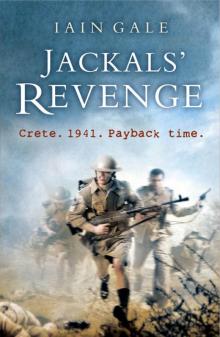 Jackals' Revenge
Jackals' Revenge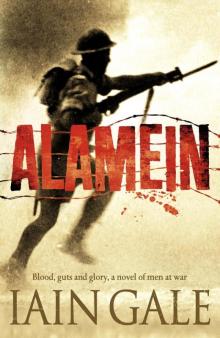 Alamein
Alamein Conspiracy
Conspiracy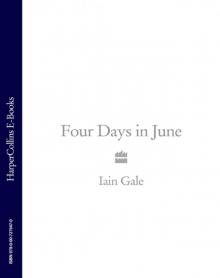 Four Days in June
Four Days in June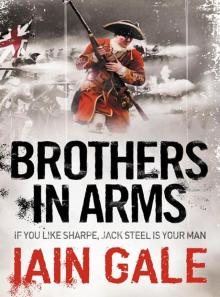 Brothers in Arms (Jack Steel 3)
Brothers in Arms (Jack Steel 3) Brothers in Arms
Brothers in Arms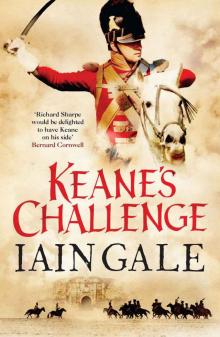 02 - Keane's Challenge
02 - Keane's Challenge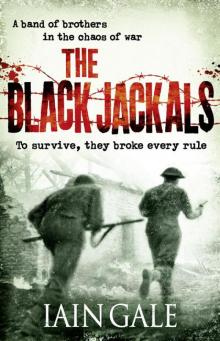 The Black Jackals
The Black Jackals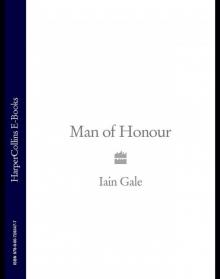 Man of Honour
Man of Honour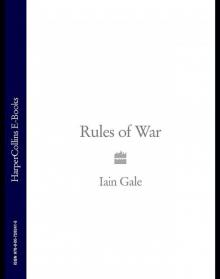 Rules of War
Rules of War